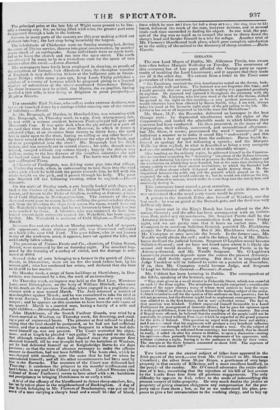IRELAND.
The new Lord Mayor of Dublin, Mr. Alderman Perrin, was sworn into office before Marquis Wellesley on Tuesday. The recurrence of this ceremony has of late years afforded the Orange party an oppor- tunity of insulting the Lord Lieutenant ; and it appears that they made use of it the other day. We extract from a letter in the Times some particulars of what occurred.
Ilis Excellency received the civic functionaries seated on the throne, look- ing remarkably well and firm. The footstool was not forgotten this time; sail I could perceive that one smart gentleman in waiting appointed peculiarly its engineer. He removed and replaced it throughout the ceremony with the nicest care. Mr. Littleton, who last year stood at the left of the throne, shifted his ground to the right on this occasion,—a very prudent movement, as he would otherwise have been elbowed by Baron Smith, who, I am told, always takes Ida stand at his favourite right angle of the gilt railing to the left. Mr. Littleton has not at all improved in his looks since last Michaelmas." Mr. Shaw, M. P. the Recorder, delivered an harangue in the best Orange style : he deprecated interference with the rights of the Corporation, and lauded the admirable mode in which hitherto their concerns had been conducted. Ile then presented, in the name of the Corporation, their willing, unreserved, and unconditional allegiance: but Mr. Shaw, it seems, pronounced the word " unreserved" in so indistinct a manner as to make it sound like " undeserved"; and this called forth a buz of applause from the audience. Baron Smith de- livered an apology for not delivering a speech ; and the Marquis Welk:ley then replied, in what is described as being a very energetic and caestic oration, but the report of it is miserably meagre.
After touching on the ordinary topics, he addressed himself to the Conserva- tive insinuations iespecting the " destroying" intentions of the Reform Govern- ment; and declaring his earnest wish to preserve the liberties of the subject and the institutions on which they were founded, but at the same time declaring his strong anxiety to clear those ancient institutions, to which the Recorder had referied, of those abases which disfigured and might destroy them. He dis- tinguished betwecii the noble oak and the parasite which preyed on it. He t.,spectell the oak, and would cultivate it ; but he would not cultivate the ivy., which, if allowed to remain, would strike its roots deep into the stately tree, and
eventually destroy it. • This extempore burst caused a great sensation. The Government officers refused to attend the civic dinner, as it was understood that the usual party toasts would be given. A private in the Sixtieth Rides shot himself at Wexford, one day last week: he was on guard at the Barrack-gate, and the deed was very deliberately done.
The vacant seat in the King's Bench has been offered to the At- torney-General ; and the offer has been accompanied with an intima- tion, that, under any circumstances, Mr. Sergeant Perrin shall be the Attorney. General. This communication took place since Friday night, and we are pretty sure that it bears no earlier date. Mr.' Crampton is to continue Solicitor-General, provided Mr. Blackburne accepts the Puisne Judgeship. But if Mr. Blackburne refuse, then Mr. Crampton at once ascends the bench. In the former case, Mr. Woulfe would obtain the coil; and in the latter, that is, if Mr. Black- borne declined the judicial honour, Sergeant O'Lophlen would become Solicitor-General ; and we have not heard upon whom it is likely the second coif would devolve. In any case, Sergeant Perrin is to. be Attoreey-General, and Mr. Woulfe Sergeant. Mr. O'Loghlen's immediate promotion depends upon the course the present Attorney_ General shall decide upon pursuing. But then it is imagined that Judge Vandeleur will be induced to retire on a pension at November. If so, then Mr. Crampton would become Judge, and Sergeant O'Loghlen Solicitor-General.—Freeman's Journal.
Mr. Cobbett has been lecturing in Dublin. The correspondent of the Giche, speaking of the lectures, says- " They were given in a small theatre in rishamble Street, which was crowded on each of the three nights. The attendance last night comprised a considerable. portion of the upper classes ; many of whom were anxious to hear the argu- ments of Cobbett on Poor-Laws, which formed the leading subject of the aeries. Okbett intended to call for the opinion of his audience on that question; but he did not pm severe, lest the division might lead to unpleasant consequences. Repeal was alluded to in the first lecture, but in very 'in:decided terms. The fact re, that question was blinked. Cobbett expressed himself favourable to a Local Parliament for management of domestic affairs; but he gave his opinions upon it with great diffidence, from his imperfect knowledge of the country. But even if Repeal were effected, he believed that the condition of the people could not be materially improved without Poor-hees v hich lie regarded as the grand panacea for the etvil.of Ireland. This question he urged with great force and ability; and I am el w.inced that his arguments will produce a very beneficial influence in the ptovees through which he is about to make a tour. On the subject of banking ao.l currency he refrained from entering; but intimated, that he should be ready, if called on after his return to Dublin, to open a discussion—stating his opinions—then patiently listening to the statements of his opponents, antic without claiming a reply, leaving it to the audience to decide by their votes. The receipts at the three lectures amounted to about 150/. The expenses of the theatre were about 201."


















 Previous page
Previous page